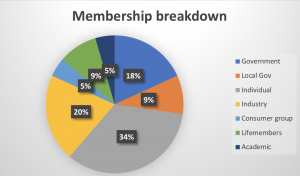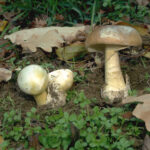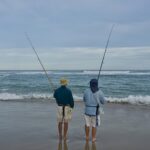Contents
- Chair report
- Objective 1 Conduct a successful Australian Food Safety Week and Summer campaign as well other relevant campaigns throughout the year
- Objective 2: Ensure our work is based on scientific evidence, including identifying and dealing with emerging risks
- Objective 3: Secure sufficient funding for operational and educational activities and comply with our reporting and tax requirements
- Objective 4 Increase the number of and engage with our membership
- Financial Report as at 30 June 2020
Chair report
Building on the successes of previous years, we are pleased to report that 2019–20 has been another highly successful year for the Food Safety Information Council, particularly with respect to audience reach. Our Australian Food Safety Week campaign ‘Excellent eggs – handle them safely’ reached a total media audience of 2.1 million and the radio and TV Community Service announcements were broadcast nationally. In addition, our handwashing campaign reached a media audience of 2.6 million. Videos from both these campaigns were run on Tonic Health Media in medical centres during December 2019 and January 2020 where they reached an audience of 15 million.
Our new financial model has seen annual membership subscriptions fund our day to day costs. Additionally, charitable donations of $15,000 and in-kind contributions enabled us to run Australian Food Safety Week and the summer campaign as well as a handwashing campaign.
At the end of the 2019-20 financial year the Food Safety Information Council had a net profit of $5,938.21 having met all its liabilities.
2019-20 has been a turbulent year, to say the least. We have seen our work increase during the year especially with the high number of consumer and media food safety enquiries during fires, floods and storms. Following the global pandemic of COVID-19 we have seen a further noticeable increase in food safety concerns and enquiries. We wrote to both the Federal Health Minister and the Victorian Health Minister seeking supplemental financial support to cover this additional workload. We also wrote to the Federal Charities Minister seeking some financial relief as we did not qualify for any of the COVID-19 funding as we do not have paid staff. The only advice we have had is to take out a loan which clearly is not a feasible option.
Looking ahead, 2020–21 is going to be a challenging year. To date we have already seen our sponsorship income halved, although payment of membership fees remains stable. We are readying for the year ahead by increasing the number of our members who are willing to volunteer for the Council. We have also prepared a COVID-19 response plan which ensures that Board and Committee members are able to support each other’s work.
We have also simplified our objectives to better suit the operation of a small charity such as ours with limited resources. They now are:
- Conduct a successful Australian Food Safety Week and Summer campaign, as well other relevant campaigns throughout the year.
- Ensure our work is based on scientific evidence, including identifying and dealing with emerging risks.
- Secure sufficient funding for operational and educational activities and comply with our reporting and tax requirements.
- Increase the number of and engage with our membership.
Finally, I would like to thank the Board, our Committee members, our sponsors and all our members for the time and commitment they give to our organisation in helping Australians keep food safe. In particular I would like to thanks Rachelle Williams, for all her achievements as former Chair and for continuing as Company Secretary until March 2020 to help hand over her role.
Thank you also to the sponsors for the current year – First for Training (Food Safety Week) and Ecolab and ACCORD for our handwashing research.
Cathy Moir
Chair
Food Safety Information Council Ltd
Objective 1 Conduct a successful Australian Food Safety Week and Summer campaign as well other relevant campaigns throughout the year
The Communication Committee is chaired by Lydia Buchtmann who is a member of the Public Relations Institute of Australia and has more than 30 years as head of communications at a number of organisations including Food Standards Australia New Zealand. The Committee was strengthened with the addition of a number of other volunteer professionals including Doriena Parsons Communications and Marketing Specialist, Vicki Taylor Communication Specialist and Jonelle Christensen Content/Social Media Specialist.
With the financial and in-kind support of our Gold Sponsor, Australian Pasteurised Eggs, Australian Food Safety Week 2019 and our summer campaign ‘Excellent eggs – handle them safely’ reached a total media audience of 2.1 million. Our radio and TV community service announcements ran nationally and our video was screened through Tonic Health Media in doctors’ surgeries, health centres, hospitals and pharmacies in December 2019 and January 2020 where it reached an audience of over 15 million. National Omnipoll research found that 24% of Australian adults recalled hearing egg safety messages over the Summer which equals approximately 5 million Australians
We also ran a national handwashing education campaign for consumers which was launched in October 2019 using media, posters and a video with sponsorship from our industry members Symbio and Accord. The media coverage of this campaign reached a national audience of 2.6 million and the video was screened through Tonic Health Media in doctors’ surgeries, health centres, hospitals and pharmacies in December 2019 and January 2020 where it reached an audience of over 15 million.
Throughout the year we also issued advice on: fermented foods, Christmas and Summer entertaining, bush fire and power outages food safety advice, back to school lunchboxes, back to Uni handwashing, death cap mushrooms, COVID-19 and food advice, home pickling, back yard chickens and World Food Safety Day.
More than half of the media interviews we do are in response to media enquiries. This year they have included: food storage, sausage safety, food being sold illegally on social media,freezing mince, raw fish, pulses, hamburgers, bushfire food safety, fridge storage, holiday food safety, MCG food poisoning, food safety myths and using the phone on the toilet.
We updated the security certificate on our website and have upgraded our capacity as our users increase and approximately 1,000 unique visitors use our website each day. We get 3,000 to 4,000 impressions on twitter each month and we have 4200 likes on Facebook. During the year we were successful in establishing our Google ads grants and are receiving approximately 5,700 impressions a month.
Objective 2: Ensure our work is based on scientific evidence, including identifying and dealing with emerging risks
To ensure the messages given by the Food Safety Information Council Inc. are both consistent and technically accurate the Scientific Committee reviews all technical publications and press releases containing technical information before release. The name of the Technical Committee was changed to Scientific Committee in April as this was a better reflection of our role.
The Scientific Committee is made up of professional food technologists/microbiologists with extensive experience in food safety. The members of the Scientific Committee for 2020 were Brigitte Cox (Chair), Dr Trish Desmarchelier, Karen Ferres, SA Health, Associate Professor Julian Cox and James Conlan, FSANZ (James left in February and has been replaced by Zoe Bartlett, FSANZ Senior Microbiologist).
New press releases cleared this year include:
- Handwashing in October 2019.
- Two egg releases in November.
- Christmas in December.
- Back to school lunchbox, water saving and back to university in February.
- COVID-19 media release in May.
- World Food Safety Day in June.
- Backyard Chickens in July.
- Seafood parasites in August.
- Unregulated home cooked food sold online.
Also the Committee:
- Produced a fact sheet on Kombucha Tea.
- Reviewed the need for a fact sheet on Kefir but decided it was not necessary.
- Fact sheet on water saving with food safety.
- A fact sheet on COVID-19.
- Produced a fact sheet, in conjunction with A/Prof. Shokoofeh Shamsi from Charles Sturt University who is an expert in the area, on how to avoid parasitic infections from seafoods.
- Contacted the ABC regarding misinformation on their site about pickling foods.
- Contacted Northern Beaches on 2 occasions regarding their reducing food waste advicewhich was misleading and helped to correct their information.
- Reviewed the Highfield e-learning course and brochure and discussed necessary changeswith Andrew Mathieson
- Contacted ACT government who is running a food waste campaign to correct some oftheir statements in their ‘Love to Store’ poster.
Complex enquiries handled:
- Enquiry on ham in a fridge turned off for 2 days.
- Cooking for elderly neighbours.
- Vegan cheese shelf life enquiry.
Objective 3: Secure sufficient funding for operational and educational activities and comply with our reporting and tax requirements
All of the Food Safety Information Council Board is responsible for managing this objective. The Board met 11 times during 2019/20 and consists of:
- Cathy Moir Chair and Company Secretary (10/11 meetings)
- Brigitte Cox Vice-Chair and Chair of the Scientific Committee (10/11 meetings)
- Lydia Buchtmann Director and Chair of the Communications Committee (10/11 meetings)
- Dean McCullum Director and Chair of the Membership Committee (7/11 meetings)
- Rachelle Williams Company Secretary (until March 2020) (6/7 meetings)
- Julian Cox Director (since March 2020) (4/4 meetings)
Our Annual General Meeting was held in October 2019 and a Special General Meeting was held in March 2020 in conjunction with our Annual Planning Day.
The total equity in our bank accounts at 30 June 2020 was $58,063.91 which included $20,000 kept aside to cover any costs should we ever need to wind up the organisation.
At the end of the 2019-20 financial year the Food Safety Information Council had a net profit of $5,938.21 having met all its liabilities.
A number of errors in our Xero accounting package were recently discovered where some expenditure had not been imported from our bank feed, some of which dated back to December 2018. This has now been amended but has affected our previous 2 years profit and loss statements: 2018-19 originally showed a $4117.64 profit and the corrected amount is a $1542.42 loss while 2017-18 originally showed a $1076.88 profit and the corrected amount is a $923.12 loss. As a result, our previous annual reports have been amended and the Australian Charity and Not-for-profits Commission notified. Income and expenditure over a financial year often depends on which time in the financial year our annual memberships and sponsorships are paid however over a three-year period from 30 June 2017 to 30 June 2020 we have seen our assets increase by $2972.67. We would like to thank our long-term member Accord for their administrative assistance in this matter.
Our annual GST activity statement for 2019/20 was submitted to the ATO in September 2020 (due March 2021) and a refund of $1,104 received. We have also amended our previous 2 years’ activity statements and are due additional GST refunds.
Our 2018/19 annual information statement was lodged with the Australian Charity and Not- for-profits Commission in November 2019 before the December 2019 deadline. This year’s deadline has been extended to March 2021 due to COVID-19 however we should be able to lodge well before that.
We recognise that our work is supported by both cash sponsorship and also the pro bono contributions in time and expertise of our supporters which is worth many thousands of dollars. The Board and members of the FSIC want to sincerely thank and acknowledge the following sponsors and supporters for their generous support both financially and in other ways. FSIC recognises that without this support the organisation would not have been able to spread the food safety message in 2019/20: Australian Pasteurised Eggs, Symbio, Accord, Food Standards Australia New Zealand, Media Heads, Omnipoll, Tonic Health Media and CSIRO.
Objective 4 Increase the number of and engage with our membership
Dean McCullum is Chair of the Membership Committee with day to day administration by Lydia Buchtmann
We currently have 51 members and were pleased to welcome 7 new members this year: Daxa Chauhan, Julian Cox, First for Training, Pam Young, Graham Jopling, Ralph Greco, Andrew Matthews and Roy Palmer. Animal Medicines Australia has formally resigned. Emma Butler is no longer with CaterCare and we would like to thank Emma for her contribution to the Communications Committee. We were also saddened to hear of the death of our Life Member Tania Bradley this year. Tania was our Executive officer from 2001 until 2007 and continued to be an active member of the Communication Committee until recently.
Current members are:
Professional organisations: Dietitians Association of Australia
Consumer organisations: Choice
Companies: Australian Pasteurised Eggs, Catercare, Ecolab, Elanco Australasia, First for Training, Gourmet Guardian, Merieux Nutrisciences, Symbio Australia, Whiteley Corporation
Individuals: Susan Bennett, Rozzi Campbell, Daxa Chauhan, Julian Cox, Maria Deckys, Tressna Martin, Rob Meagher, Roy Palmer, Lauren Preston, Jack Stratford, Ralph Greco, Graham Jopling, Andrew Matthews, Pam Young
Industry organisations: Accord Australasia, Animal Medicines Australia, Australian Eggs, Australian Pasteurised Eggs, Australian Chicken Meat Federation Incorporated, Red Meat Advisory Council
Government: ACT Department of Health & Community Care, Department of Health Western Australia, Department of Health Tasmania, Food Standards Australia New Zealand, New South Wales Food Authority, Northern Territory Department of Health & Community Services, OzFood Net, Queensland Health, Safe Food Queensland, South Australia Department of Health
Life members (for long term contribution): Lydia Buchtmann (Communications Director), Brigitte Cox (Vice Chair and Technical Committee Chair), Patricia Desmarchelier – Food Safety Principles (former Technical Committee Chair), Michael Eyles (former Chair), Rachelle Williams AnYi (Past Chair)
Local Government: Goyder Council, Surf Coast Shire Council and City of Wodonga Council.
Research organisations: CSIRO, Australian Food Safety Centre of Excellence




